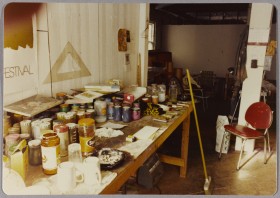How to Talk About Anti-Black Racism, Part Three

How to Talk About Anti-Black Racism, Part Three
Two years ago, we came together for a round table discussion on how to speak about anti-Black racism with the art in the AGO's collection as an entry point. Sadly, the horrific impact of continued hate and systemic anti-Black racism brings us together for a part three. Join me Audrey Hudson, Richard & Elizabeth Currie, Chief of Education & Programming, as I moderate this round table discussion with community members, artist educators, teachers and activists: Freda Bizimana, Brandon Hay, Joy Martyr-Andre, Emmanuel Tabi, Sam Tecle and Laurie Townshend. This round table discussion is for teachers, parents and anyone who wants to have these brave conversations.
Watch parts one and two of this ongoing conversation. This conversation will be recorded and shared here shortly after the live event.
My name is Freda Bizimana and my artist name is Freda Dae. I am a new artist who is ready to embark on this musical journey. I am a singer/ songwriter and I’ve been singing and performing since I was young. Music has been my passion and has been a source of healing. For the longest time music was just a hobby but in recent years it has become my therapy. Alongside being an artist, I am a Social Worker who recently completed a Masters in Social Work at The University of Toronto. I am passionate about working with Black youth and supporting them with navigating anti-Black racism within the different systems and creating a space for expressing and healing.
At the age of 24, Brandon Hay, founder of the Black Daddies Club (BDC), discovered he was about to become a dad for the first time. Being raised by a single mother and without the presence of a consistent father figure, he was filled with anxiety and fear about his own ability to be a great father. Knowing of other men in his situation, he believed that a forum where they could share ideas, struggles and victories seemed like it could be an effective network for support. Thus, in 2007, Hay founded BDC in response to the isolation he felt as a new Black father as well as to the lack of forums and spaces for Black men to discuss parenting issues and concerns facing the Black community as a whole. The main goals of the organization are to change the image of the “absent Black father” that is prevalent in the media and to assist young Black men to become better fathers. In so doing, BDC aims to support Black children, families and the larger community.
Dr. Audrey Hudson is an educator, researcher and futurist. Hudson is Richard & Elizabeth Currie Chief, Education & Programming, Audrey joined the AGO in 2017 as Associate Curator of Schools & Early Childhood Programs. She holds a PhD from University of Toronto/Ontario Institute for Studies in Education (UT/OISE). Most recently, Hudson co-edited a groundbreaking text entitled, In This Together: Blacknesss, Indigeneity and Hip-Hop, and an article, What Can Hip-Hop Teach Us: Learning From A Young Indigenous Artist. Hudson believes that the arts are a way to bring rich knowledge and voices of young people into spaces to discuss social change, environment, culture and relationship building.
Joy Martyr-André is a visual artist, educator and an equity and inclusive education advocate. As a visual artist, Joy explores the reality of ancestral blood memories and how it manifests in our current consciousness. As an educator, she has years of experience teaching high school visual arts and humanities. She believes that in teaching through a social justice lens, we can amplify the voices of those whose stories have yet to be told. She, also deeply believes that the medium of the Arts has both power and impact as an educational learning tool, across all subject platforms. Joy uses the Arts in both teaching and staff professional development, to highlight and entice discourse on anti-Black racism and social justice concerns.
Dr. Emmanuel Tabi is an Assistant Professor in the Department of Integrated Studies in Education. Dr. Tabi completed his doctoral degree in Curriculum, Teaching and Learning at OISE/University of Toronto. He has also successful completed a post-doctoral appointment through the Black Child and Youth Studies Network at the University of Windsor. Further, Dr. Tabi holds an M.Ed degree in Human Development and Applied Psychology and has extensive teaching experience in sociology, community education and youth studies. Dr. Tabi’s intersectional Black Studies frameworks, strong arts-based and community-engaged scholarship with/in Black communities, and his wide experience working with school boards to address issues of equity, position him at the cutting-edge of crucial education conversations and school-community-university collaborations in Canada. Dr. Tabi has most recently been published within the Peabody Journal of Education, and has an upcoming article within the Comparative Education Review.
Sam Tecle is Assistant Professor of Community Engaged Learning at New College, University of Toronto. His work focuses on Black and Diaspora Studies, Urban Studies, and Sociology of Education. His forthcoming work: Black Grammars: On Difference and Belonging focuses on the experiences and perspectives relating to blackness and Black identification of East African Diasporas across the UK, Canada and the US. He has held graduate student fellowships at both Harvard (2016) and Northwestern University (2014) in their respective African & African American Studies Departments. A former middle school teacher, Sam is a community advocate who has worked on a number of community projects concerned with the wellbeing, social lives, schooling experiences and educational outcomes of Black students.
Writer-director, educator and photographer Laurie Townshend holds the belief that we shape stories; thereafter stories shape us. With this philosophical grounding, Laurie views the art of storytelling as a way to dream ourselves into being. With a thematic lens aimed squarely on acts of courage made visible through crisis, The Railpath Hero (2013) features a spellbinding performance by Stephan James (Selma, Race, Beale Street), in a story about the threads of resilience that hold a young athlete's life together in the wake of childhood sexual abuse. Laurie’s take on human connectedness is explored in Human Frequency Streetdocs (2014). Award-winning Charley (2016) connects the work of late civil rights activist Charles Roach to today’s BLM movement. Currently, Laurie is in post-production on Away With Words (working title), a coming-of-middle-age saga that follows Staceyann Chin, Brooklyn’s most outspoken poet-activist and poster-mom for radical Black parenting as she raises her daughter Zuri, while investigating the past of her own mother who abandoned her as an infant. Through Staceyann’s efforts to raise an empowered Black child and heal her own childhood wounds, this film explores the ways Black women have learned to mother their children, their communities, and ultimately themselves.
